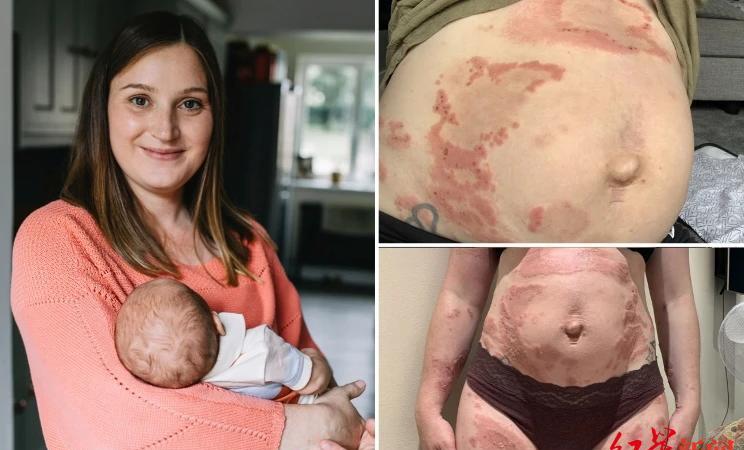At the end of 2020, Fiona Hooke, who lives in Hampshire, England, welcomed her second child. However, what she did not expect was that this pregnancy experience actually made her miserable, because she actually had an "allergic" reaction to the child's genes.
Recently, the mother shared photos of blisters and scars all over her body during pregnancy, and told how a rare immune skin disease made her allergic to her child.

According to foreign media reports on February 13, when Hooke was 31 weeks pregnant, she suddenly found a red itchy area like a nettle thorn on her stomach, and the situation became more and more serious, and the constant rash and blisters were painful and itchy, making her feel like her entire abdomen was "on fire".
"A few days later, I went to the doctor because they were getting more and more itchy and unbearable." She recounted. Doctors prescribed her some steroid creams, but still didn't solve the problem, and the red, itchy area of her skin became larger and larger until her entire stomach was covered with red patches.
By the 35th week of pregnancy, the situation had gotten worse, and Hook, who couldn't stand it anymore, had to go to the emergency room, where doctors injected her with steroids for four days before her symptoms eased. However, two days before giving birth, her skin once again began to appear unbearable itching and pain. 24 hours after giving birth to his son Barney, allergies "exploded" into incredible pain blisters, with my abdomen, thighs, arms and chest all over the place, "it hurts when I hold my son, so I can't enjoy this stage at all".
After postpartum blood tests, doctors confirmed Hooke had a rare autoimmune pregnancy pemphigus and said it was possible that one of her son's genes triggered an allergic reaction that caused her immune system to attack her own skin. Because this did not happen when she first became pregnant.
"They thought it might have something to do with the child — something in the father's DNA triggered the placenta to start attacking a protein that was also present in the skin, so my body started attacking my skin." My son must have inherited this gene from his father, because I didn't react that way when I first became pregnant. Hooke explained.
Gestational pemphigus is reported to be very rare, with one in every 50,000 pregnant women suffering from the disease. Hooke said she had never heard of the disease before and now shared her experience in the hope of making people aware of the disease.
Hooke said she had been taking oral steroids of varying intensities for six months after her diagnosis and did not discontinue them until Christmas. She said that although the itching spots, blisters and scars caused by the extreme reaction have finally subsided, she still needs to use steroid cream regularly and may experience mild symptoms from time to time.
"A lot of people have to go through immunosuppressive therapy to get rid of steroids and get their condition under control, so I'm lucky." "But I may always have some symptoms, but not as severe as they used to be," she said. This led me to postpone my plans to get pregnant again, especially as studies showed that the condition (in the next pregnancy) would occur earlier and more severely. So even with steroids, I won't get pregnant again. ”
Red Star News reporter Xu Huan
Edited by Pan Li
(Download Red Star News, there are prizes for the newspaper!) )